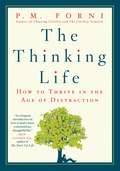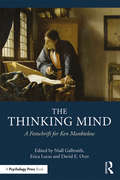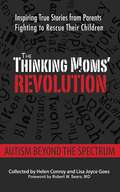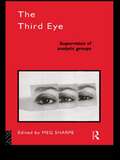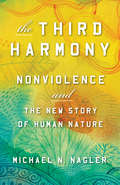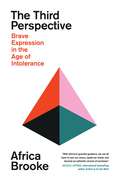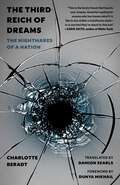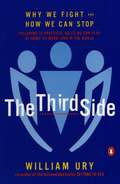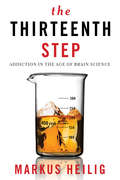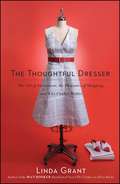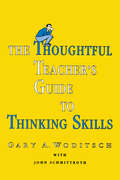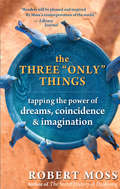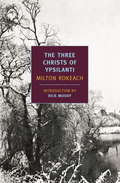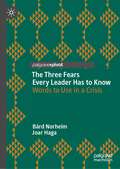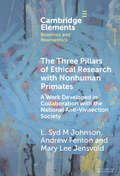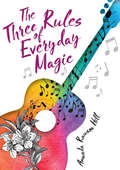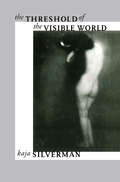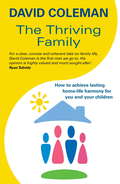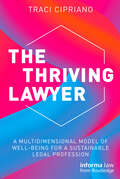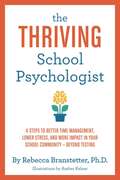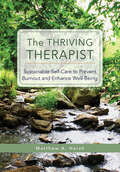- Table View
- List View
The Thinking Life: How to Thrive in the Age of Distraction
by P. M Forni<p>How do we turn off the noise of daily life, turn on our brains, and begin to engage in that fundamental human activity known as thinking again? P.M. Forni, America's civility expert has given some thought to how we can successfully think our way through a greatly distracting world and live a better life. <p>In The Thinking Life, he looks at the importance of thinking: how we do it, why we don't do it enough and why we need to do more of it. In twelve short chapters, he gives readers a remedy for the Age of Distraction, an age fuelled by social networking overload, compulsive texting and an omnipresent stream of cellphone calls.</p>
The Thinking Mind: A Festschrift for Ken Manktelow
by Niall Galbraith Erica Lucas David OverThe field of thinking has undergone a revolution in recent years, opening itself up to new perspectives and applications. The traditional focus on laboratory-based thinking has transformed as theoretical work is now being applied to new contexts and real-world issues. This volume presents a state-of-the-art survey of human thinking in everyday life, based around, and in tribute to, one of the field’s most eminent figures: Ken Manktelow. In this collection of cutting-edge research, Manktelow’s collaborators and colleagues review a wide range of important and developing areas of inquiry. This book explores modern perspectives on a variety of traditional and contemporary topics, including Wason’s reasoning tasks, logic, meta-reasoning, and the effect of environment and context on reasoning. The Thinking Mind offers a unique combination of breadth, depth, theoretical exploration and real-world applications, making it an indispensable resource for researchers and students of human thinking.
The Thinking Moms' Revolution: Autism beyond the Spectrum: Inspiring True Stories from Parents Fighting to Rescue Their Children
by Robert W. Sears Helen Conroy Lisa Joyce GoesThe Thinking Moms’ Revolution (TMR) is a group of twenty-three moms (and one awesome dad) from Montana to Malaysia who all have children with developmental disabilities. Initially collaborating online about therapies, biomedical intervention, alternative medicine, special diets, and doctors on the cutting edge of treatment approaches to an array of chronic and developmental disabilities, such as autism, sensory processing disorders, food allergies, ADHD, asthma, and seizures, they've come together into something far more substantial. Suspecting that some of the main causes may be overused medicines, vaccinations, environmental toxins, and processed foods, they began a mission to help reverse the effects. In the process, they became a tight-knit family dedicated to helping their kids shed their diagnoses. Here, collected by Helen Conroy and Lisa Joyce Goes, are the stories of their fights to recover their kids from autism and related disorders. With each chapter written by a different TMR member, they share how they discovered each other, what they learned from each other, and why it’s important to have close friends who understand what it's like to parent a child with special needs. You'll read about the their experiences, and learn how their determination and friendships have become a daily motivation for parents worldwide.
The Third Eye: Supervision of Analytic Groups (The International Library of Group Psychotherapy and Group Process)
by Meg SharpeThe Third Eye provides a detailed and practical exposition of one of the most important but least documented skills required of those practising in the expanding discipline of group analysis. The relevance of the material, which is contributed from the dual perspective of both experienced practitioner and inexperienced trainee, extends far beyond its field of origin. It will be of significant interest to a wide readership of all those concerned with the training assessment and development of others working with groups.
The Third Harmony: Nonviolence and the New Story of Human Nature
by Michael N. NaglerIn the latest fruit of a brilliant career, Michael Nagler argues that nonviolence—not just as a tactic but as a way of being—is the only way to unite deeply divided people and enable progressive movements and leaders of all stripes to fulfil their promise and potential.So many of the problems that beset us—war, poverty, isolation, and the climate crisis—have their roots in an old story about the universe: we are purposeless matter in a random void, and scarcity, competition, and violence are inevitable. Citing the convergence of modern science and the essence of the world's wisdom traditions, Michael Nagler argues for a new story: the universe is conscious and purposeful, humans are spiritual beings, and cooperation and collaboration are our natural way of interacting. This “new story” has had other champions, but Nagler is the first to realize that a piece is missing. For the new story to take hold, we have to embrace nonviolence, not only as a social change tactic but as a way of life. Nonviolence is the only power strong enough to “move the heart” toward this deep and revolutionary change in worldview. Nagler refers to this as the “third harmony,” which is the harmony within and among us to resolve the crisis of the human image. Calling on us to realize the urgency of nonviolence for resolving our personal and collective problems, Nagler focuses on how to shift to our story on a personal, everyday level and then integrate it into the very foundations of our understanding of humanity and community, for our sake, for the sake of future generations, and the sake of nonviolence itself.
The Third Perspective: Brave Expression in the Age of Intolerance
by Africa BrookeAMAZON BEST BOOK OF MAY 2024 In our deeply divided, binary world, honest discussion is stressful for all sides. International thought leader Africa Brooke says there is another way: the Third Perspective. In this manifesto, Africa teaches us how to return to critical thinking and reduce societal divides by opening our minds and being more self-questioning in difficult discussions. This book will help you figure out what you truly believe—as opposed to parroting or having knee-jerk reactions in conversation. You&’ll learn to share your views, hear theirs, make a point you feel must be made, and try to find common ground without self-censorship or self-sabotage. This personal guide helps readers move away from rigid thinking, allowing them to enter any potentially difficult discussion about politics, work, personal responsibility, race, sex, gender, religion — whatever the subject — while maintaining integrity, authenticity, and openness, and successfully expressing opinions while listening to contrary points of view. Africa has built a successful business coaching an exclusive roster of high-profile clients seeking to handle themselves in the public eye. The tools offered in The Third Perspective have been honed over years of that experience: hers is a proven system that works. She offers readers a new path for communication, and because communication is everything, critical to building trust and fruitful relationships, a life transforming experience. Africa Brooke&’s framework has three pillars—Awareness, Responsibility, and Expression—that ask: what is stopping you from speaking your mind, what do you stand for, what are you willing to risk?
The Third Reich of Dreams: The Nightmares of a Nation
by Charlotte BeradtThe hidden history of a nation sleepwalking its way into evilCharlotte Beradt began having unsettling dreams after Adolf Hitler took power in 1933. She envisioned herself being shot at, tortured and scalped, surrounded by Nazis in disguise, and breathlessly fleeing across fields with storm troopers at her heels. Shaken by these nightmares and banned as a Jew from working, she began secretly collecting dreams from her friends and neighbors, both Jewish and non-Jewish. Disguising these &“diaries of the night&” in code and concealing them in the spines of books from her extensive library, she smuggled them out of the country one by one.Available again for the first time since its publication in the 1960s, this sensational book brings together this uniquely powerful dream record, offering a visceral understanding of how terror is internalized and how propaganda colonizes the imagination. After Beradt herself fled Germany for New York, she collected these dream accounts and began to trace the common symbols and themes that appeared in the collective unconscious of a traumatized nation. The fear of dictatorship was ever-present. Dreams of thought control, even the prohibition of dreaming itself, bore witness to the collapse of outer and inner worlds.Now in a haunting new translation by Damion Searls and with an incisive foreword by Dunya Mikhail, The Third Reich of Dreams provides a raw, unfiltered, and prophetic look inside the experience of living through Hitler&’s terror.
The Third Side: Why We Fight and How We Can Stop
by William L. UryIt takes two sides to fight, but a third to stop. Distilling the lessons of two decades of experience in family struggles, labour strikes, and wars, he presents a bold new strategy for stopping fights. He also describes ten practical roles--as managers, teachers, parents, and citizens--that each of us can play every day to prevent destructive conflict. Fighting isn't an inevitable part of human nature, Ury explains, drawing on his training as an anthropologist and his work among primitive tribes and modern corporations. We have a powerful alternative--The Third Side--which can transform our daily battles into creative conflict and cooperation at home, at work, and in the world.
The Thirteenth Step: Addiction in the Age of Brain Science
by Markus HeiligThe past thirty years have witnessed a revolution in the science of addiction, yet we still rely on outdated methods of treatment. Expensive new programs for managing addiction are also flourishing, but since they are not based in science, they offer little benefit to people who cannot afford to lose money or faith in their recovery.Clarifying the cutting-edge science of addiction for both practitioners and general readers, The Thirteenth Step pairs stories of real patients with explanations of key concepts relating to their illness. A police chief who disappears on the job illustrates the process through which a drug can trigger the brain circuits mediating relapse. One person's effort to find a burrito shack in a foreign city illuminates the reward prediction error signaled by the brain chemical dopamine. With these examples and more, this volume paints a vivid, readable portrait of drug seeking, escalation, and other aspects of addiction and suggests science-based treatments that promise to improve troubling relapse rates. Merging science and human experience, The Thirteenth Step offers compassionate, valuable answers to anyone who hopes for a better handle on a confounding disease.
The Thoughtful Dresser
by Linda Grant"You can't have depths without surfaces," says Linda Grant in her lively and provocative new book, The thoughtful Dresser, a thinking woman's guide to what we wear. For centuries, an interest in clothes has been dismissed as the trivial pursuit of vain, empty-headed women. Yet, clothes matter, whether you are interested in fashion or not, because how we choose to dress defines who we are. How we look and what we wear tells a story. Some stories are simple, like the teenager trying to fit in, or the woman turning fifty renouncing invisibility. Some are profound, like that of the immigrant who arrives in a new country and works to blend in by changing the way she dresses, or of the woman whose hat saved her life in Nazi Germany.The Thoughtful Dresser celebrates the pleasure of adornment and is an elegant meditation on our relationship with what we wear and the significance of clothes as the most intimate but also public expressions of our identity.
The Thoughtful Dresser: The Art of Adornment, the Pleasures of Shopping, and Why Clothes Matter
by Linda Grant"You can't have depths without surfaces," says Linda Grant in her lively and provocative new book, The thoughtful Dresser, a thinking woman's guide to what we wear. For centuries, an interest in clothes has been dismissed as the trivial pursuit of vain, empty-headed women. Yet, clothes matter, whether you are interested in fashion or not, because how we choose to dress defines who we are. How we look and what we wear tells a story. Some stories are simple, like the teenager trying to fit in, or the woman turning fifty renouncing invisibility. Some are profound, like that of the immigrant who arrives in a new country and works to blend in by changing the way she dresses, or of the woman whose hat saved her life in Nazi Germany.The Thoughtful Dresser celebrates the pleasure of adornment and is an elegant meditation on our relationship with what we wear and the significance of clothes as the most intimate but also public expressions of our identity.
The Thoughtful Teacher's Guide To Thinking Skills
by Gary A. WoditschFrom the vantage of new cognitive theory, this book manages to integrate the thinking skill mission across the full range of formal instruction, from K through graduate school. It explores and prioritizes thinking skill aims at each instructional level, and then details how classroom practice can adjust to achieve those aims. This guide leads to solid ground, perspective and technique for the individual teacher at any level who wants to enhance thinking skill development. It will prove indispensable to those planning curriculum with a thinking skill emphasis.
The Thoughtful Teacher's Guide To Thinking Skills
by Gary A. WoditschFrom the vantage of new cognitive theory, this book manages to integrate the thinking skill mission across the full range of formal instruction, from K through graduate school. It explores and prioritizes thinking skill aims at each instructional level, and then details how classroom practice can adjust to achieve those aims.This guide leads to solid ground, perspective and technique for the individual teacher at any level who wants to enhance thinking skill development. It will prove indispensable to those planning curriculum with a thinking skill emphasis.
The Three "Only" Things: Tapping the Power of Dreams, Coincidence, and Imagination
by Robert MossHave you ever said something was only a dream, only a coincidence, or only your imagination? In this book you’ll discover that these “only” things can be keys to finding and living your bigger story. You’ll learn to tap into the nine powers of dreaming, the nine rules of coincidence, and the seven uses of imagination. You’ll be inspired by stories of how innovators and world changers have used these gifts, and you’ll learn wonderful games to help you access your intuition, heal yourself, and bring juice to your everyday life. When we claim the power of the Three Only Things, we reclaim tools that are profoundly simple yet have the power to remake our lives and the world.
The Three Christs of Ypsilanti
by Rick Moody Milton RokeachOn July 1, 1959, at Ypsilanti State Hospital in Michigan, the social psychologist Milton Rokeach brought together three paranoid schizophrenics: Clyde Benson, an elderly farmer and alcoholic; Joseph Cassel, a failed writer who was institutionalized after increasingly violent behavior toward his family; and Leon Gabor, a college dropout and veteran of World War II.The men had one thing in common: each believed himself to be Jesus Christ. Their extraordinary meeting and the two years they spent in one another's company serves as the basis for an investigation into the nature of human identity, belief, and delusion that is poignant, amusing, and at times disturbing. Displaying the sympathy and subtlety of a gifted novelist, Rokeach draws us into the lives of three troubled and profoundly different men who find themselves "confronted with the ultimate contradiction conceivable for human beings: more than one person claiming the same identity."u're not!" "I'm God, Jesus Christ and the Holy Ghost! I know what I am. . .") we see the three Christs argue, proclaim, and soliloquize about the nature of their contentious divinity, and are given a window onto one of the most remarkable psychological case studies on record.
The Three Christs of Ypsilanti: A Psychological Study
by Milton RokeachIn 1960 psychologist Milton Rokeach staged an unusual experiment to study questions of identity and delusional thinking. He brought together three chronic schizophrenic patients at Ypsilanti State Hospital in Michigan, each of whom believed himself to be Jesus Christ. For over a year the research team and the three patients met daily. This book is an account of what occurred in and outside these meetings as the three Christs struggled to adjust their concept of themselves against the fact that others claimed the same identity. Although some of the researchers' methods seem questionable by today's standards, this is a fascinating look at how beliefs are formed and sustained, and a poignant portrayal of three deeply troubled human beings.
The Three Fears Every Leader Has to Know: Words to Use in a Crisis
by Bård Norheim Joar HagaFear is an inescapable part of how human beings experience reality. The impact of fear becomes particularly evident in a crisis. When a crisis strikes, be it a war, a pandemic, global warming or a financial crisis, leaders are challenged to exercise sound judgement by speaking and acting. This book argues that there are three fears every leader has to know – apocalyptic fear, political fear, and private fear. By appealing to these three fears in an adequate manner, a leader’s appeal to fear may serve a constructive purpose in a crisis.
The Three Pillars of Ethical Research with Nonhuman Primates: A Work Developed in Collaboration with the National Anti-Vivisection Society (Elements in Bioethics and Neuroethics)
by L. Syd Johnson Andrew Fenton Mary Lee JensvoldThe Three Pillars (Harmonization, Replacement, and Justice) describe an ethical path forward and away from the use of nonhuman primates in harmful research and scientific use. Conducting nonhuman primate research in an ethical way that acknowledges their moral importance requires satisfying more rigorous guidelines and regulations modeled on those that apply to similarly vulnerable human subjects, especially children and incarcerated persons. This Element argues for the moral necessity of harmonizing human and nonhuman primate research ethics, regulations, and guidelines in a way that protects all primates, human and nonhuman. The authors call for the replacement of nonhuman primates in research with human-relevant methods that do not simply shift research onto other nonhuman animals, and challenge publics, governments, and scientific communities worldwide to implement justice in the selection and use of all research subjects. This title is also available as Open Access on Cambridge Core.
The Three Rules of Everyday Magic
by Amanda Rawson HillMagic doesn't work the way you think it will, but it's what Kate needs as she confronts friendship trouble, her parents' divorce, and Grammy's dementia in this emotionally resonant middle-grade novel by debut author Amanda Rawson Hill. <P><P> Kate has trouble believing in magic, especially since the people she loves keep leaving her. But when Grammy tells her the three rules of everyday magic—believe, give, and trust—Kate can't resist believing, at least a little. Following Grammy's advice, she tries to bring her father, her best friend, and even Grammy herself back to her. Nothing turns out as Kate expects, yet the magic of giving—of trusting that if you love and give, good things will happen—will change Kate and her family forever. <P><P> This beautifully written coming-of-age story is about the power of kindness and the ties that bind families especially during hard times.
The Threshold of the Visible World
by Kaja SilvermanIn The Threshold of the Visible World Kaja Silverman advances a revolutionary new political aesthetic, exploring the possibilities for looking beyond the restrictive mandates of the self, and the normative aspects of the cultural image-repertoire. She provides a detailed account of the social and psychic forces which constrain us to look and identify in normative ways, and the violence which that normativity implies.
The Thriving Family: How to Achieve Lasting Home-Life Harmony for You and Your Children
by David ColemanEvery parent's goal is to raise happy, healthy children who can thrive and flourish whatever the challenges faced along the way. In The Thriving Family, leading psychologist David Coleman shares his unique vision to show us how.Outlining his core principles of 'kind but firm' parenting, he reveals how powerful tools such as empathy, positive reinforcement and setting successful boundaries can lead to a loving, supportive and calm home environment that allows every member to thrive.Drawing from his vast experience working with families, he looks at new ways to approach common issues, including adapting to parenthood; dealing with bullying, drugs and alcohol; creating healthy social networks online and in real life; dealing with separation and loss; enhancing sibling harmony and reducing rivalry; thriving when your children move on.Whatever the situation or challenge, The Thriving Family empowers parents to create the best future for their children, and encourages children to step into it with joy and confidence.
The Thriving Family: How to Achieve Lasting Home-Life Harmony for You and Your Children
by David ColemanEvery parent's goal is to raise happy, healthy children who can thrive and flourish whatever the challenges faced along the way. In The Thriving Family, leading psychologist David Coleman shares his unique vision to show us how.Outlining his core principles of 'kind but firm' parenting, he reveals how powerful tools such as empathy, positive reinforcement and setting successful boundaries can lead to a loving, supportive and calm home environment that allows every member to thrive.Drawing from his vast experience working with families, he looks at new ways to approach common issues, including adapting to parenthood; dealing with bullying, drugs and alcohol; creating healthy social networks online and in real life; dealing with separation and loss; enhancing sibling harmony and reducing rivalry; thriving when your children move on.Whatever the situation or challenge, The Thriving Family empowers parents to create the best future for their children, and encourages children to step into it with joy and confidence.
The Thriving Lawyer: A Multidimensional Model of Well-Being for a Sustainable Legal Profession
by Traci CiprianoThe Thriving Lawyer: A Multidimensional Model of Well-Being for a Sustainable Legal Profession is based on an innovative model, grounded in science. This book serves as a resource for promoting well-being and culture-change in the legal community by educating about pertinent issues impacting lawyers, and how to address them. It is a roadmap, highlighting the many over-arching and inter-connected aspects of well-being, and enabling readers to identify and target the issues most relevant to their unique situations. Along with practical strategies, the book provides a big-picture framework, illustrating how the many intersecting individual and organizational factors which influence well-being are all related, yet separate and distinct. The framework provides a foundation for creating change, and where you focus first will depend on the needs, the situation, and any unique challenges faced by you or your organization. The Thriving Lawyer explains why, in addition to self-care, change is needed on the organizational level in terms of workplace culture and policies, as well as normalizing self-care and eradicating stigma. This book is intended to benefit individual lawyers, their organizations, and professionals who support them, by educating, motivating, and promoting self-care and healthy work environments.
The Thriving School Psychologist: 4 Steps to Better Time Management, Lower Stress, and More Impact in Your School Community--Beyond Testing
by Rebecca BranstetterARE YOU READY TO MAKE A BIG IMPACT IN THE WORLD AS A SCHOOL PSYCHOLOGIST?-Do you want to spend more time with students, rather than with their paperwork? -Are you interested in expanding your role beyond testing to do passion projects?-Do you want to cultivate a community of support with others who share your vision for student success?-Do you want to hit the professional happiness "reset button" on your career so that you are energized to go to work each day? YOU CAN DO IT. YOU HAVE THE POWER TO BE MORE THAN A TESTING MACHINE. YOU CAN BE A CHAMPION FOR STUDENTS.In the Thriving School Psychologist, popular blogger and author Rebecca Branstetter reveals the four most common burnout traps for school psychologists ... and how to avoid them. Don't let your dreams of making a real difference in the lives of your students go unfulfilled. You don't have to table your passion projects and interventions because you're bogged down in bureaucracy. No matter if you're a first year intern or a seasoned veteran, you will learn practical tools for transforming your career into the one you've always imagined. And you can start using these tools TODAY.
The Thriving Therapist: Sustainable Self-Care to Prevent Burnout and Enhance Well-Being
by Matthew A. HershThe Thriving Therapist provides an integrative, holistic, and developmentally sensitive path to assist therapists in assessing their unique needs and proactively structuring sustainable self-care practices, in alignment with their values. Self-care shouldn&’t feel like a burden. Professional self-care can be enjoyable, personally meaningful, and sustainably integrated into mental health practitioners&’ lives. Included in this book are diverse and vital resources that help practitioners: Go beyond one-off activities to create a self-caring lifestyle; Strengthen the guiding values by which they live and work, in order to prevent burnout and embody wellness; Cultivate mindful awareness of their needs both personal and professional, with special attention to the alignment of the person-practitioner-work environment; Build powerful inner resources such as gratitude, self-compassion, forgiveness, and humor to soothe in response to threats and bounce back from daily challenges; Implement and sustain healthy lifestyle habits that transform &“simply getting by&” into more easeful and meaningful living, including neurophysiological supports, meditation and subtle energy practices, mindful media consumption, and community-building.
